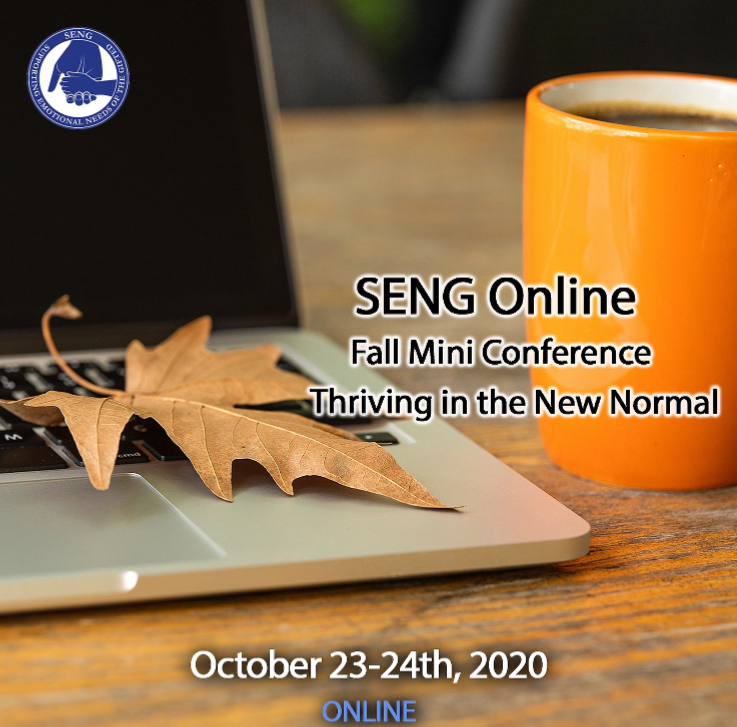
This weekend, SENG (Supporting the Emotional Needs of the Gifted) hosted its annual mini-conference – all online, of course, which made attendance even easier than usual. I liked the fact that there was an intriguing but limited array of discussions to attend (i.e., no need to make choices), and that I could miss certain sessions without too much regret or guilt given that all registrants will receive session recordings at a later date.
Whew. All boxes checked. It’s almost like SENG anticipates highly anxious, perfectionist individuals’ concerns and addresses them in advance.
In this blog post, I’d like to share a few key take-aways from the sessions I did manage to attend “live” (in between caring for my kids and managing the inevitable array of needs that come up when five people are co-existing in one living space together).
I missed the opening remarks (by Mike Postma) and first session (by Jaime Castellano) because I failed to notice the small but important detail of all events occurring on Eastern Standard Time – whoops.
(Believe it or not, I actually appreciate making errors like this, since it helps me tap into authentic empathy for my overly busy adult students as well as my own kids, all of whom struggle with executive functioning challenges in some way.)
I thus entered into the second presentation (on nurturing creativity, by Matt Zakreski) midway, and was too discombobulated to continue. I’ll revisit the recording later.
The biggest draw for me was Seth Perler‘s talk entitled “Imagine a New Normal That Addresses Executive Functioning Needs of the Gifted”. I first heard Seth on Debbie Reber’s Tilt Parenting podcast a couple of years ago and was struck by how relevant and useful his work is – but I was also instantly overwhelmed by how much work I still need to do to help set my kids up for independent success (and so… I set it mostly aside).
As I took notes during Seth’s SENG talk this weekend, I reflected back on all the (probably similar) notes I took when first listening to him on Tilt Parenting, and was reminded about the power of revisiting concepts in a cyclical fashion, after some time has gone by. My deep dive these past two years into the challenges gifted kids face has been truly overwhelming – especially since I have three of them, my husband also struggles with executive functioning issues, and I’m busy processing my own gifted childhood and adulthood. I’m constantly reminding myself to look at this journey as a marathon, not a sprint.
In terms of take-aways from Perler’s SENG talk, here are a few:
- Put simply, “executive functioning” (which sounds super-fancy and complicated) simply means “how you get things done.” However, executive functioning is far from simple. It’s actually enormously complex, and involves many components that all need to be in place in order for things to be moving along smoothly – including but not limited to planning, time management, organization, prioritizing, decision making, details, transitions, self-starting, and follow-through. (No wonder I was and am overwhelmed! If these things don’t come “naturally” to a person, it’s a pretty big task to tackle them one by one.)
- As parents, we need to consider how to personalize and customize a study routine and environment for our child while addressing their preferences and brainstorming work-arounds. In other words, “best practice means differentiation.”
- Speaking of best practice, Seth notes that “great teachers help students feel safe, seen, and engaged.” Amen to that.
After listening to Seth’s inspirational and compassionate talk, I decided it’s finally time to outsource this critical work to an Executive Functioning coach to ensure my 12-year-old C. (struggling in middle school) gets explicit help sooner rather than later. I’m trying to shift my thinking from:
“If only I were on-top-of-it-enough, I could help C. implement all these strategies!”
to
“Thank goodness there are professionals out there experienced in this work, who we can tap into as part of our extended learning and support community”.
The closing afternoon session – entitled “Perfect is Boring. Improv Comedy for Gifted People”, hosted by members of the Improv Therapy Group – was one I attended BECAUSE it was the only option on the menu, though I quickly realized how fun and informative it actually was. I had to turn my video ON and actively participate (!), which was all part of helping audience members feel less self-conscious and more willing to take risks.
Despite my lifelong dislike of improv (“I’m not good at that! I can’t study for it! I will embarrass myself!”), I grew to actually enjoy all the activities we engaged in – especially as the facilitators explained how and why they were each valuable learning opportunities. (“Oh, I’m learning something? Cool! I can dig it, even if it’s uncomfortable.”)
Take-aways from this session include a much deeper understanding of how valuable (indeed, therapeutic) theatrical improvisation really is, given that:
- Improv artists have to pretend to do things they’ve NEVER done.
- Improv teaches you sometimes there are things you just can’t ever get right.
- Improv teaches you to be okay with whatever’s being created by the group.
- Improv allows you to turn a seemingly awful activity into something enjoyable.
The next morning I once again missed the two earliest SENG sessions – not just because of wanting to sleep in later than 7:00 a.m., but because I had to host a “live” (by Zoom) seminar for students in a class I’m teaching this quarter. When factoring in an additional one-on-one check-in with a student, and getting my youngest child settled into a playdate with her quarantine-bubble friend, I wasn’t ready to join the SENG Mini-Conference again until it was time for the session intriguingly entitled “Gifted & 2e Students: Now is Your Chance to Change the Rules”. Okay! That sounded really good to me.
This session was co-hosted by Jacqui Byrne and Lynne Henwood, both involved with an amazing set of private schools for 2E learners called FlexSchool, with campuses in New York and New Jersey. They argue that now is actually a perfect time to rethink “how we do schooling” given how much is already changing in the world, through no fault or volition of our own.
I took fewer notes overall during this session and was more just resonating and nodding along with the concepts, all of which made complete sense to me as an educator and someone who has repeatedly rejected (or at least strongly questioned) traditional schooling models myself. I want something like FlexSchool available for my kiddos!
One note I will share, though, is that I was struck by their emphasis on how 2E kids question their elders – they don’t automatically assume that because someone is older, they’re “right”. This is a complicated reality, since it goes against so many taboos – including the deep reverence for knowledge of elders in indigenous communities. There is enough to explore in the topic of gifted kids vis-à-vis elders that I’ve just realized I’ll need to designate a separate blog post to this – but for now, I will simply state that gifted kids tend to both question authority AND seek out guidance and friendship from and with older people without hesitation. I think this is a net benefit.
The final session of the SENG Mini-Conference had a twist: the slated presenter didn’t show up, so Mike Postma pulled up one of his many presentations on twice-exceptionality and talked us through some of his key ideas. As far as I was concerned, this was an awesome opportunity, given I still have a ton of questions about the current state of neurodiversity – both in terms of what research is being done, and how it’s being perceived more broadly by stakeholder communities. His presentation gave me a lot to ponder; just a couple of take-aways include:
- We are currently learning a LOT more about what’s going on in neurodiverse brains. It turns out we all have a “brain fingerprint” that identifies each one of us as uniquely us.
- Mike’s approach to neurodiversity is to emphasize that it’s “who you are: not a condition, not a mal-adaptation, not a mind set, not a syndrome.” In a previous post about my 10 year old son D., I similarly noted the need to approach neurodiversity from a strengths-based perspective, so I appreciated having this reinforced.
(Interestingly, during the seminar I held earlier that morning with my own students – before I was able to rejoin the SENG conference – one of my participants, a doctoral student in Special Education, mentioned her frustration that her textbook for a course – published as recently as last year – still approaches the autism spectrum from a purely medicalized – and hence, pathology-oriented – perspective. Grrrrr.)
Back to the SENG Conference, I left feeling “full” and grateful. I tend to resist over-stuffing my hours with too many screen-based webinars and conferences, which are all over the place right now due to COVID; the sheer amount can feel overwhelming. However, there is a true value and joy in joining people “real time” (albeit virtually) to discuss important ideas – and SENG’s offerings are exactly the type of support I need these days, as I’m figuring out both my own past as a gifted kid AND how to understand and support my three highly unique gifted kiddos.
It’s incredible to know that people at these conferences really do have each other’s backs – or at least, that’s how it seems to me. We’re all there because we understand how much it (can) hurt to be different, and we’re driven to express our diverse perspectives on challenging issues, working through them together.
Stay tuned for Part 2, once I watch the recorded sessions I missed…
Copyright © 2020 by HalfoftheTruth.org. Please feel free to share with attribution.
